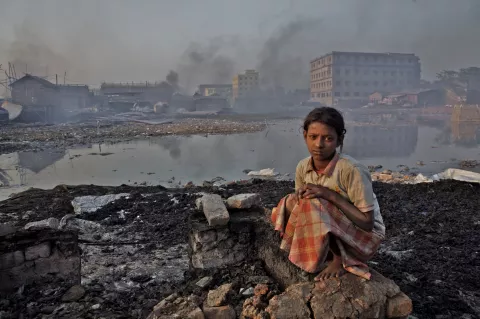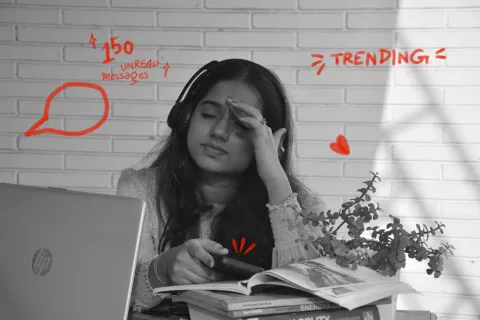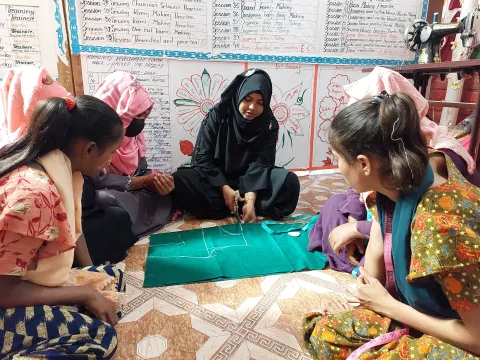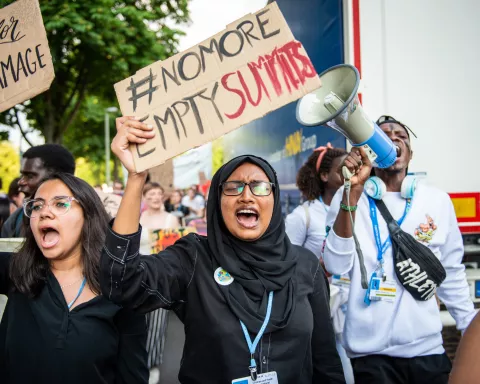Returning home from my university on a hot day, I craved a chilled sugary drink. I rushed to the fridge to grab one, sat on my sofa and started scrolling social media. That’s where I saw an ad for some burgers and fries. I decided to order. I was hungry and needed some energy to finish my to-do list for the day.
I didn’t know at this point that eating this type of highly processed food would make me feel lazier, sleepier — and affect my whole life in a negative way.
I had moved away from home in 2021, when I was 18, to continue my education. It was my first time living without my family and looking after myself independently. I was out of my comfort zone and overwhelmed. There were so many things to do, and in all the chaos, I overlooked my diet because it seemed the easiest and quickest thing to do.
As young people, we’re constantly conditioned that eating junk food will make us happy. It’s on our TVs, in our schools, in the shops on our walk home — it’s hard to escape it.
Whenever my friends and I would get hungry, we’d crave a bag of chips, biscuits or crispy patties — easy to get hold of and cheap. This was the only type of food that crossed our minds. We thought all other food was boring.

About 4 weeks after moving away from home I started losing focus on my studies. I continued eating whatever I craved, until one day my stomach hurt so badly I could barely walk. My body was giving me a message.
My doctor told me it was the result of all the unhealthy food I had been eating. Food that was ultra-processed, high in fat, sugar and salt, and low in fibre and essential micronutrients. They suggested I make a conscious effort to eat a healthy and balanced diet that gave me all the right nutrients.
Just like the fast food ads — this was something I couldn’t ignore. I knew I had to make a change.
It was daunting at first because I didn’t know much about what was in the food I was eating or what constituted a balanced diet. I was so used to processed food. I started with what the doctor had advised: eating more vegetables and meals made at home, drinking more water and exercising more.
I also started doing my own research, learning more about the ultra-processed food I’d been eating — and the growing science that shows just how bad it is for us.
Numerous research has shown that eating lots of ultra-processed foods increases our risk of chronic diseases like obesity, type 2 diabetes and heart diseases, damages our mental health and shortens our lifespan.
What I found really shocking is that ultra-processed food is deliberately designed to taste better than healthy food and make us crave more. It’s full of cheap ingredients to boost profits at the expense of families’ and children’s health.
I tried to stop eating ultra-processed foods as much as possible. I also started to notice just how much unhealthy food all my friends at university ate. Many of them were also struggling with stress, anxiety and some had been diagnosed with hypertension.
One of the problems is that people don’t realise how bad junk and ultra-processed food is for us. It’s become completely normal in our lives. It’s become how we celebrate an occasion — fizzy drinks, deep fried food and loads of sweets.
And this is largely down to the advertising we are bombarded with every day. Food and drink companies spend billions of dollars marketing junk food that targets us — especially children and young people from poorer families and countries who may find it hard to afford healthy alternatives.
And there’s hardly any laws to stop it.

All of this means that food that damages our physical and mental health is cheaper, easier to get hold of and more in our faces than healthy food that helps us develop. (There are never any adverts for fresh green vegetables or yummy fruit!)
And it’s working. In all countries in South Asia, the sale of sugar-sweetened beverages, confectionery, and sweet and salty snacks is rising very rapidly. And so are the rates of diseases.
The World Health Organisation’s Global Health Observatory finds that the percentage of children who are overweight or obese increased by over 7% in Bhutan, Maldives, Nepal and Sri Lanka between 2006 and 2016.
In Pakistan, we’re struggling with the twin problems of over-nutrition and poor nutrition.
The Pakistan National Nutrition Survey found that nearly 18% of adolescent boys and 17% of girls were overweight. While nearly 8% of boys and 5.5% of girls were classed as obese.
The problem is huge. And we need governments to step in and help stop it.
We need laws that restrict companies and influencers from marketing junk food, especially to children.
And we need governments to help educate people on healthy diets and make them more affordable than the junk food that harms our health.


This can be done through public health campaigns on the negative and lifelong impacts of junk food, but also through making healthier habits easy and budget friendly.
Children and young people need to be taught about healthy eating and cooking as part of the curriculum. And we need healthy and affordable options in the places we are most of the time — our schools, colleges and universities.
Since I started eating a healthier diet, I feel more productive, authoritative, responsible and happier than ever before. I also have more energy, which has had a positive impact on my learning and ambitions for the future.
Every child and young person has the right to these benefits that come from a healthy diet. But the environments we live in are robbing us of this right. We need action now.

About the author:
Ayesha Shaikh is a human rights and climate change activist from Pakistan. She uses her voice to engage with other young people and raise awareness about issues close to her heart like gender equality, sustainable climate action, mental health and well-being as well as promoting peace and justice in the world.





